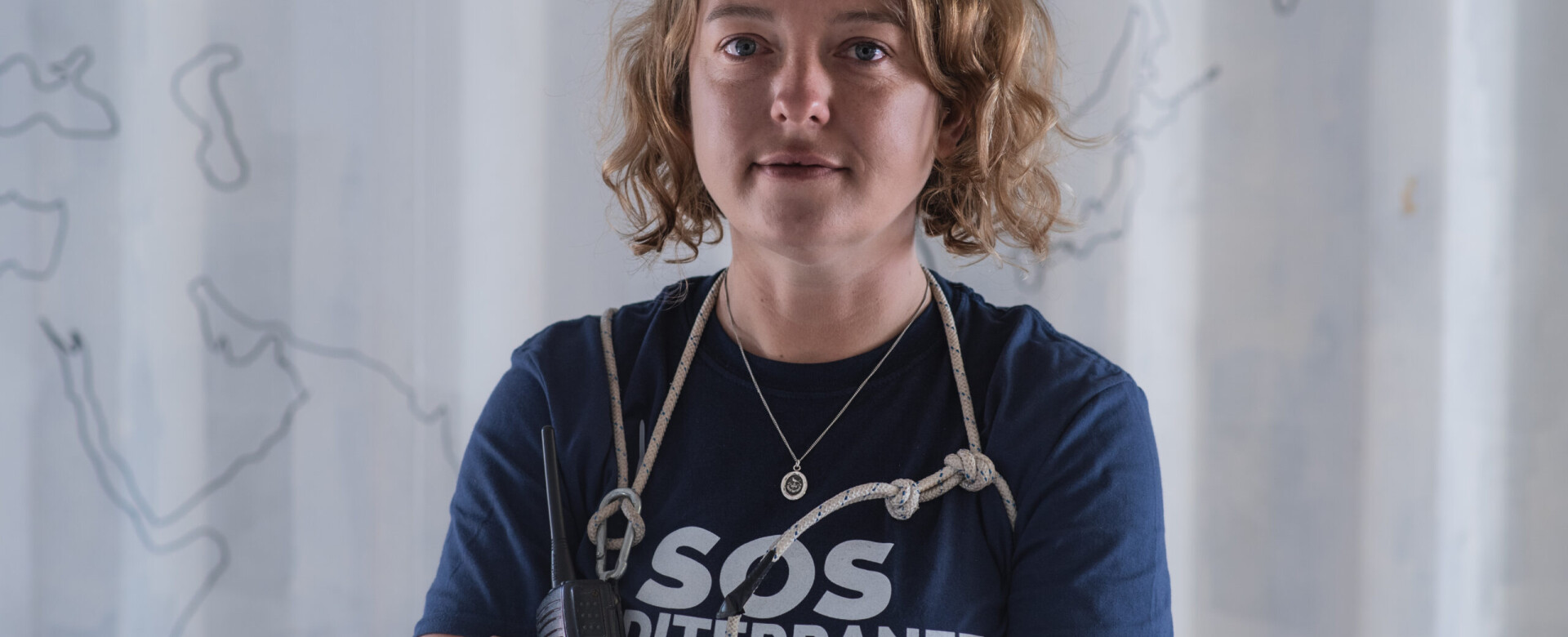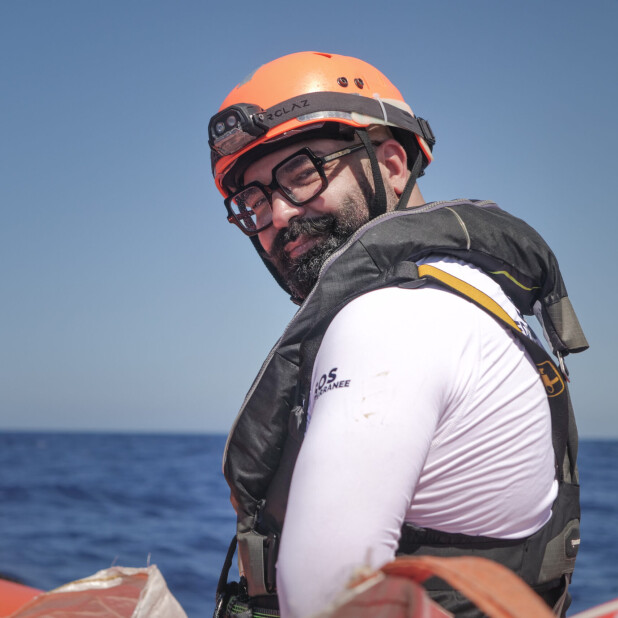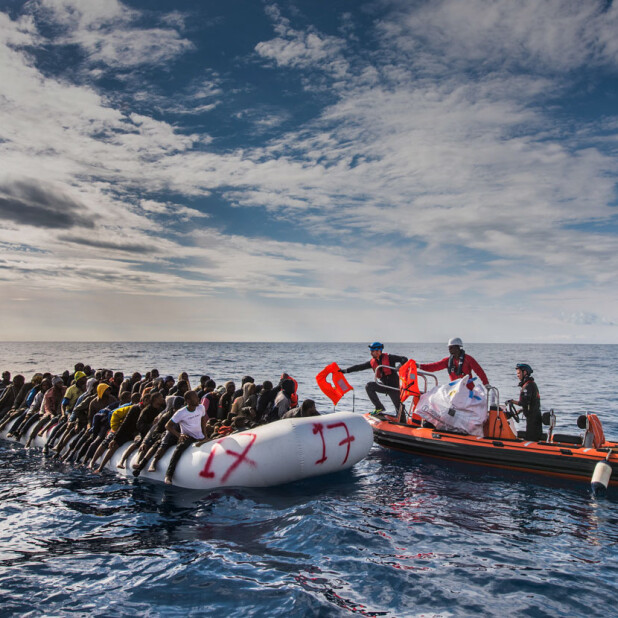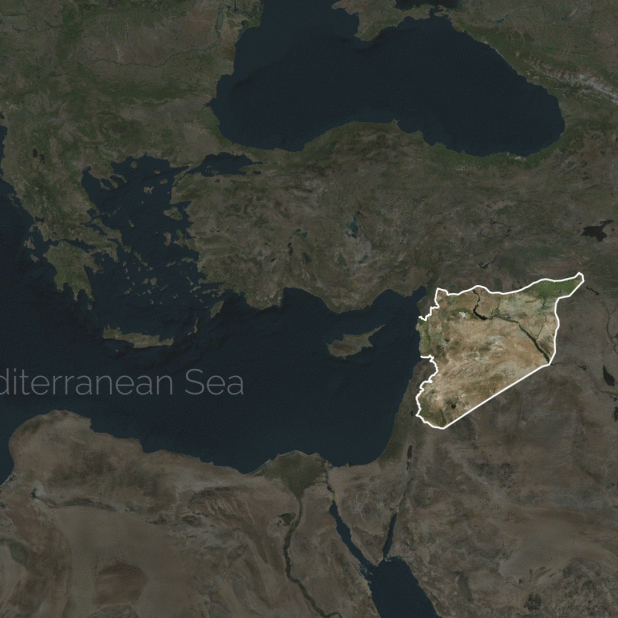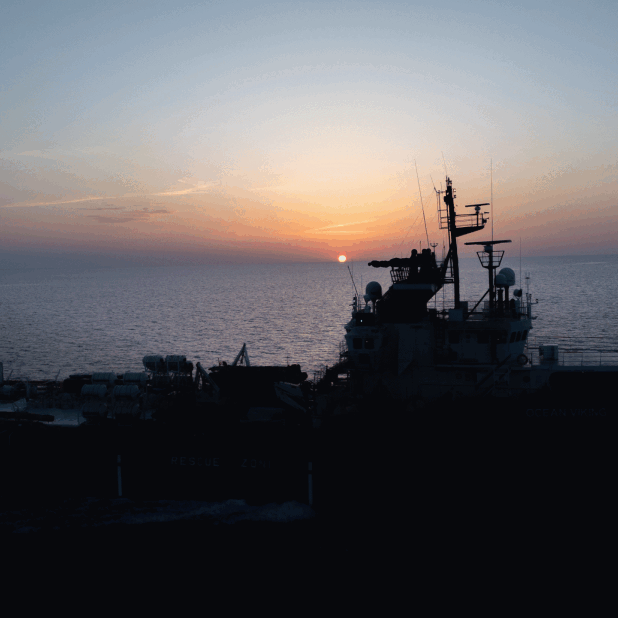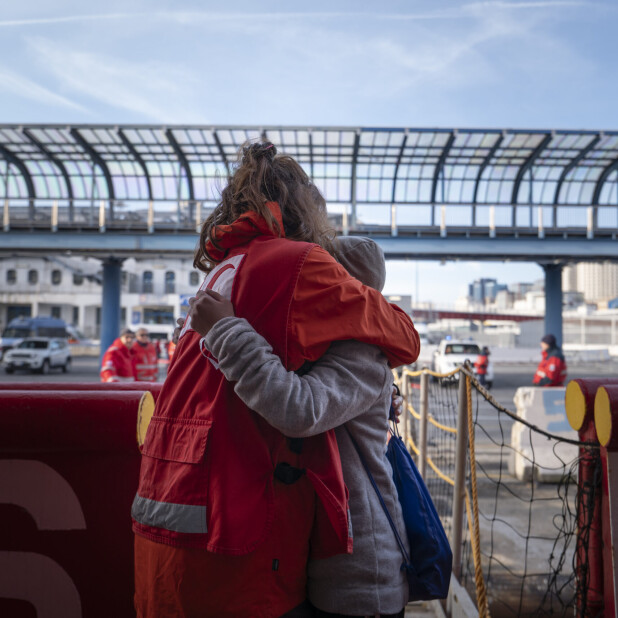
Dominika, Head of the Medical and Protection Department at SOS MEDITERRANEE, first embarked on Aquarius as a nurse in 2018. Today, she explains the mechanisms for mitigating and treating psychological risks for crew members onboard Ocean Viking, to help them overcome the impact of the stress and trauma experienced during their missions at sea.
Dominika oversees all post-rescue activities in cooperation with the medical and protection teams of SOS MEDITERRANEE and the Federation of Red Cross and Red Crescent Societies (IFRC). This includes, among other things, recruiting and training staff, supplying the clinic, setting up protocols for treating survivors. She also set up the mental health support system for the teams at sea.
1- What are the main psychological risks faced by crews onboard civil rescue ships at sea?
While they are directly exposed to traumatic events such as shipwrecks, drownings, loss of life, serious injuries or threats to their safety (e.g. gunshots from the Libyan coastguard), crew members are also at risk of indirect trauma as they listen to the stories of rescued people, who may suffer psychological distress as a result of rape, physical violence, torture, extortion, or other. In addition, working onboard can be very demanding and stressful, in a very confined environment with little privacy and few opportunities to relieve stress. The crew is also confronted with unpredictable elements such as weather conditions or a difficult political context, as well as the risk of the ship being detained and other forms of criminalization of our work. There can be a lot of frustration and anger that builds up over time.
Automatic and uncontrollable, reactions vary from one person to another and can occur at the time or once the event is over. These reactions may include anxiety, fear, shock, anger or guilt, for example. Physical reactions such as hypervigilance, fatigue, dizziness, headaches, body aches or insomnia may also be present. These reactions are normal, especially in the first 72 hours, and can develop very quickly.
On the other hand, we should start to worry if these emotions remain strong for weeks or even months, with further anxiety, withdrawal, insomnia, addictive behaviour, etc. These may be symptoms of post-traumatic stress, burnout or depression, for example, for which specialised psychological support will be needed.
But many of us find meaning and value in our work, which can be very rewarding and fulfilling. We work in a context where people are highly motivated and where the level of mutual care is high. I love the quote on the coffee machine in the office in Marseille: ‘Taking care of yourself is not kindness. It’s self-preservation, it’s a political act’. Humanitarians want to give a lot, but to do that, we also must take care of ourselves to be able to take care of others: you must put on your own oxygen mask before you can put on someone else’s.
2- What was the most traumatic moment you had to face?
For my first mission at sea, I was a nurse with Doctors Without Borders (MSF) [then SOS MEDITERRANEE’s medical partner onboard Aquarius]. I faced a tragic rescue on January 27, 2018. It was very difficult. I’ll never forget that day. When we arrived on the scene, the rubber boat was taking water. Chaos quickly ensued, with dozens of people falling into the water. I was the first medic to intervene on our fast rescue boat. I had to give rescue breaths and perform CPR with the search and rescue team. Then, I went onboard Aquarius to look after the injured people. We managed to resuscitate six children who had stopped breathing. Two women did not survive. We didn’t have time to stop, we were on all fronts at the same time. It was a very traumatic event for the survivors and for the team. We estimated that around thirty people died during the shipwreck.
It was only when the survivors disembarked in Sicily that we were able to catch our breath. And it was the time we spent together, as a team, that was the most helpful. That day also made our mission of rescue and bearing witness even more meaningful. Even if it was difficult, at least we did something. Our objective was clearer than ever during this tragic moment.
The Ocean Viking’s ninth mission in July 2020 was also very stressful. [We had to declare a state of emergency after major tensions onboard and suicide attempts by survivors who became desperate after being stuck at sea for days]. I was the medical team leader onboard, and as such I was responsible for looking after the team’s mental health. I saw my colleagues develop violent headaches, back pain and other psychosomatic problems.
3- What is being done to mitigate the psychological risks of the teams in the operations department?
SOS MEDITERRANEE has gradually implemented a system for preparing and training teams before and during the missions. In addition, the KonTerra program offers support sessions provided by professionals specialised in the psychological care of humanitarian personnel, enabling each person, regardless of their country of origin, gender or language, to be cared for according to their preferences. The program has three main components: training, access to psychological support (available at all times) and critical incident management.
On my opinion, training and preparation are essential. When we train new team members on board, we explain what can happen and what physical reactions to stress or trauma are possible. We give them tools to breathe, calm down and manage their stress. It’s important to think about your own coping mechanisms and develop a plan to take care of yourself and others. During training sessions, we also talk about psychological first aid, emphasizing that this can also apply to colleagues. It’s up to each and every one of us to be on alert for signs of psychological distress in our body language, and to offer an attentive ear to anyone who feels the need to confide in us.
But the most effective element is the support you build up within the team: knowing that you are not alone, because it is impossible to fully understand an experience without having lived it. After tragic events, the teams often confirmed that they need to be together, to be with other people who understand.
In terms of psychological support, the medical team is also available to assess and treat any symptoms (headaches, fatigue, insomnia, etc.), to provide psychological knowledge and to remind the crew that external support is available.
Psychologists from the KonTerra program are available to offer confidential and free consultations on all matters relating to maintaining personal resilience and well-being. These sessions are available at any time, particularly after disembarkation, especially if there has been a critical event.
Good to know: SAR YOU OK?
Dominika’s approach is also based on the protocol for the psychological care of personnel involved in rescue at sea compiled by the IMRF (International Maritime Rescue Federation) to which she herself has contributed as an expert at international working groups and conferences.
